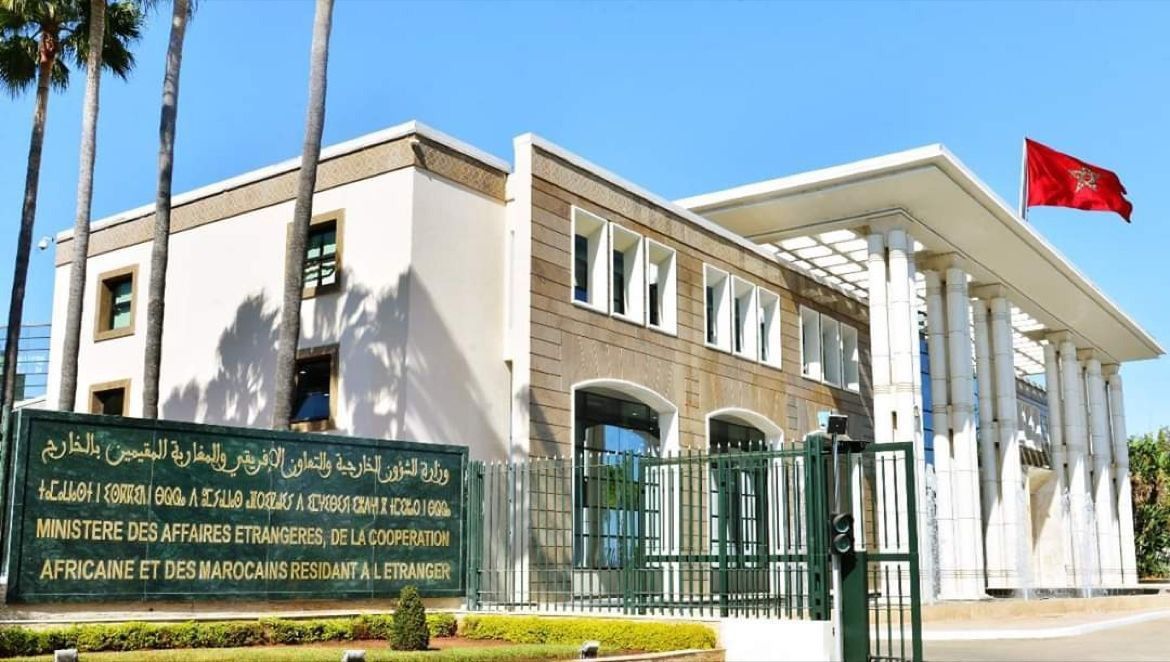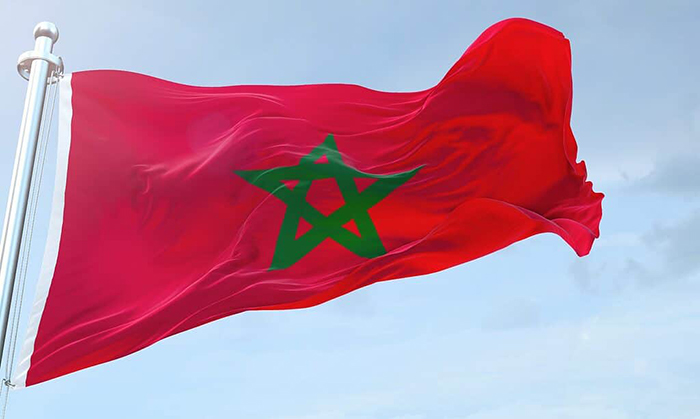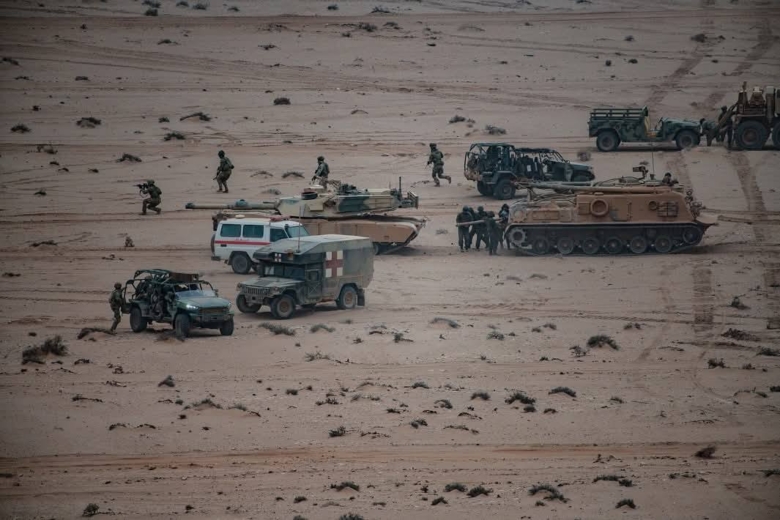Morocco places the Palestinian issue at the level of the national issue within the country’s highest interests, as Morocco has been defending peace in the region through the two-state solution and the establishment of an independent Palestinian state on the June 1967 borders, with East Jerusalem as its capital. It also opposes all unilateral measures that affect the aspirations of the Palestinians. In achieving freedom, and in the legal status of Al-Quds Al-Sharif.
Morocco places the Palestinian issue at the level of the national issue within the country’s highest interests, as Morocco has been defending peace in the region through the two-state solution and the establishment of an independent Palestinian state on the June 1967 borders, with East Jerusalem as its capital. It also opposes all unilateral measures that affect the aspirations of the Palestinians. In achieving freedom, and in the legal status of Al-Quds Al-Sharif.
The position of the Kingdom of Morocco on the Israeli-Palestinian conflict has always been characterized by clarity, balance, and wisdom, far from slogans and political outbidding that only contributed to obstructing the peace process.
The conflict in the occupied territories was renewed again on October 7, 2023. Positions in Morocco differed between official and popular. At the palace level, rationality, interests and responsibilities coexist, and the national interest prevails.
The Moroccan approach to the Palestinian-Israeli conflict:
Historically, it is worth remembering that the basic characteristic that distinguished the Moroccan approach towards the Arab-Israeli conflict was bridging the gap between the two parties and setting up channels of communication in an attempt to create the ground and climate necessary to settle the conflict.
We must remember the role that Morocco played during the era of the late King Hassan II in the peace process between the Israelis and the Palestinians, and between Israel and several countries in the Middle East and North Africa region, most notably Egypt during the era of the late President Anwar Sadat during the seventies of the last century.
The late King Hassan II played a major role in reaching the Camp David Agreement through secret communications conducted with him by senior Israeli political and intelligence officials in this regard in 1978. In 1977, senior Israeli officials went secretly to Morocco to meet with King Hassan II, and among them were Politicians: Yitzhak Rabin, Prime Minister at the time, accompanied by Yitzhak Joffe, head of the Mossad, as the foundations of the peace agreement signed in Egypt were laid, accompanied by Hassan II, whom Israel took as a mediator.
The late King Hassan II sought to move the Arab meetings from secret to public, and to directly explore the position of the Israeli side regarding the settlement of the Arab-Israeli conflict. Dr. Jack Neriah says that the role of the mediator is to facilitate [negotiation], not [direct] negotiation.
The late King Hassan II said: "We are not fighting a ghost but a people, a government and a regime. We confuse in our minds between recognition and reconnaissance, between conversation and negotiation, and during the meeting I was that non-negotiator who can take and win and can never give and miss." In response to the Arab reactions to the meeting of Ifrane on July 21-22, 1986, with Prime Minister Shimon Peres: "There is no response in the Charter of the Arab-Israeli League, Shimon Peres, nor in the resolutions of the Arab Summit, a text that prevents any Arab leader from communicating with and meeting with Zionist leaders."
Moreover, the late King encouraged actors from both sides to establish direct contacts and allowed them to meet confidentially inside Moroccan territory in order to negotiate. Hassan II also assisted in the Oslo Accords and the Jordanian Peace Treaty.
Morocco also supported the Palestinian President's application for Palestine's membership in the United Nations on September 23, 2011, which resulted in the granting of the status of a non-member observer state to Palestine by the General Assembly, and the UN General Assembly resolution, on December 21, 2017, calling on the United States to withdraw its recognition of Jerusalem as the capital of Israel. In line with the State of Palestine's efforts to join a group of international organizations, Morocco has worked to support those efforts, including the International Criminal Court, the World Customs Organization, the Agadir Convention and Interpol.
The Kingdom of Morocco has always been ahead of the curve every time the Gaza Strip or the West Bank is attacked by Israel, providing humanitarian aid, airlifts containing important medical equipment and foodstuffs, and establishing a multidisciplinary medical and surgical hospital in the Gaza Strip. In the same context, Morocco financed the construction and equipping of the Al-Quds Specialized Hospital in Gaza, which was destroyed during the Israeli aggression on the Gaza Strip in 2008, and provided 9 million US dollars as a contribution to the reconstruction of Gaza after the Israeli bombardment in 2014, in addition to 5 million US dollars ordered by His Majesty the King as cash assistance to the Palestinian Red Crescent. With special funding from King Mohammed VI, the Hassan II Faculty of Agricultural and Environmental Sciences of Al-Azhar University in Gaza was built in 2015, with a financial envelope of about 7 million and 750 thousand US dollars. Within the framework of the Kingdom of Morocco's support for the issue of building the capacities of the Palestinian people, Morocco offers 100 annual scholarships to Palestinian students to study at Moroccan higher university institutions covering all scientific, medical and engineering disciplines, as well as supporting the capacities of Palestinian State institutions in various fields.
The centrality of the Palestinian issue and the search for balance:
Domestically, the Moroccan regime relies on its citizens' strong patriotic sentiment on the Sahara issue to overshadow their strong support for the Palestinians. But the regime may find that Moroccans are unwilling to view the situation as a zero-sum game. Many Moroccans who support Morocco's claims to disputed territories and the Palestinian cause may view the normalization agreement as an unnecessary step (because they consider Morocco's claims legitimate) and a betrayal of the Palestinians. While popular disillusionment will not lead to immediate refutation, it may change the relationship between society and the state in the long run.
The Moroccan regime seeks to balance developing its nascent relationship with Israel and maintaining its support for the Palestinian cause. Indeed, the regime has repeatedly declared that its position on the Palestinian-Israeli conflict remains unchanged, as well as allowing the country's former ruling political party to hold talks with a Hamas leader. Finally, the Moroccan regime sent aid to Palestine through direct donations as well as through the Bayt Mal Al-Quds Al-Sharif Agency, a financial institution funded mainly by Morocco that focuses on humanitarian and social work in Jerusalem.
Since Moroccan foreign policy is a reserved area of the King under the Moroccan Constitution through Articles 42, 49 and 55, which came to define the competences of the King in terms of appointing ambassadors, signing international treaties, declaring a state of war and a state of siege, and he monopolizes strategic decision-making in the country (including on the Sahara issue and national security) because of its profound impact on Morocco's national security, the Royal Institution has suppressed some partisan voices that criticized the actions of the Moroccan Minister of Foreign Affairs in international forums.
The controversy was caused by the Moroccan Justice and Development Party's statement criticizing the behavior of Moroccan Foreign Minister Nasser Bourita at the African-European conferences, and the statement of the party's general secretariat stated: "The General Secretariat deplores the recent positions of the Foreign Minister, in which he seems to defend the Zionist entity in some African and European meetings, at a time when the Israeli occupation continues its criminal aggression against our Palestinian brothers..." Although the statement did not criticize the principle of normalization, it provoked the royal establishment, as the Royal Court issued a strongly worded communiqué stating:
"First, Morocco's position on the Palestinian question is irreversible, and it is one of the foreign policy priorities of the King, Chairman of the Al-Quds Committee, who placed it in the position of the Kingdom's territorial integrity. It is a firm principled position of Morocco, not subject to political bidding or narrow electoral campaigns.
Second: The foreign policy of the Kingdom is the prerogative of the King, by virtue of the Constitution, and he manages it based on national constants and the supreme interests of the country, foremost of which is the issue of territorial integrity.
Third: The Kingdom's international relations cannot be the subject of blackmail from anyone and for any consideration, especially in this complex international circumstance. Exploiting the kingdom's foreign policy for a partisan domestic agenda sets a dangerous and unacceptable precedent.
Fourth: The resumption of relations between Morocco and Israel took place in known circumstances and in a context known to all, framed by the communiqué issued by the Royal Court on December 10, 2020, and the communiqué published on the same day following the phone call between the King and the Palestinian President to inform him of the content of the phone call with US President Donald Trump, affirming, according to the statement, the Kingdom's firm position in support of the Palestinian cause without change, which calls for the two-state solution, in accordance with negotiations between the Palestinian and Israeli parties as the only way to reach a final and lasting solution. It includes this conflict, as well as the tripartite declaration of December 22, 2020, which was signed before the king.
At that time, the living forces of the nation, political parties, some leading figures and some associative bodies concerned with the Palestinian cause were informed of this decision, and expressed their commitment to it." Despite this, we affirm that Morocco, at all popular and official levels, has always been with the Palestinian people, and that the position on the Palestinian issue transcends all parties and crosses them, since when official relations between Morocco and the Zionist entity were normalized, no official statement or statement was issued by the Palestinian Authority condemning normalization, although the Palestinian factions condemned it. In June 2021, after normalization, Hamas leader Ismail Haniyeh visited Morocco, and from there he thanked the Moroccan king for his call and efforts to support the Palestinian cause, without addressing the official normalization between Morocco and Israel.
It can be said that the Kingdom of Morocco seeks to transform its relations with Israel from an adversary to an asset in its relations with the Arab world, by demonstrating the desire to exercise the role of mediator between the two parties and to pursue a balanced policy based on active involvement in the course of events.
Since the resumption of relations between Morocco and Israel, the Kingdom has been keen and consistent in its positions on the Palestinian issue, within the framework of Rabat's historical references in dealing with this issue, which place it on an equal footing with the issue of the Moroccan Sahara. The resumption of these relations between Rabat and Tel Aviv did not come separately from Morocco's support for the Palestinian cause. The Royal Cabinet communiqué issued on December 10, 2020 was clear when it said that "negotiations between the Palestinian and Israeli parties remain the only way to reach a final, lasting and comprehensive solution to this conflict.
" Morocco is one of the most important Arab countries with Israel, and finds itself in an awkward position because of the war in Gaza. Rabat’s position on what is happening is described by many as unclear, but certainly, the Kingdom of Morocco has a different approach to the issue regarding what is happening today. The conflict is renewing in the occupied Palestinian territories, this time because of the surprise attack by Hamas, and positions differ in Rabat at the popular and militant levels, but at the level of the royal palace, rationality and interests are present in addition to responsibility. Despite Morocco's distance from the region, some international media believe that it is directly involved in the issue, and that it is in an awkward position due to normalization with Israel and the inability to directly solidarity with Gaza. But in Morocco, the political vision differs and rejects this vision in black and white only, the Moroccan king has not agreed for years to receive Israeli Prime Minister Benjamin Netanyahu, despite Israel's recognition of the Moroccanness of the Sahara, but at the same time Rabat did not abandon its adherence to the position of the two-state solution, and at the same time condemned the mutual aggressions from both sides. Popular expressions of rejection of normalization with Israel during licensed public demonstrations are part of a daily measure of the right to demonstrate and also to reinforce Rabat's neutral position on what is happening.
Solidarity through advocacy... Morocco's weapon to confront Israeli arrogance:
The determinants of the Moroccan position are that the continuous support and active, continuous and serious solidarity of the Kingdom of Morocco, under the leadership of King Mohammed VI, Chairman of the Al-Quds Committee, is not governed by any political agenda, in addition to the fact that the position of King Mohammed VI of Morocco is constant and unchanging and was inherited from his father, King Hassan II .
The Kingdom of Morocco also affirms that the Palestinian cause is at the level of the Moroccan Sahara issue and that Morocco will not abandon its role in defending the legitimate rights of the Palestinian people, and that its solution in accordance with the resolutions of international legitimacy would miss the opportunity for the forces of terrorism and extremism, and that negotiations between the Israeli and Palestinian sides are the only way to reach the desired solution, which is the establishment of the State of Palestine on the borders of the fourth of June 1967, with East Jerusalem as its capital.
Morocco's pleadings were based on the principles enshrined in the "Jerusalem Call" signed on the thirtieth of March 2019 between King Mohammed VI of Morocco and His Holiness Pope Francis.
In particular, this important document stresses "the importance of preserving the city of Al-Quds Al-Sharif, as a common heritage of humanity and, above all, as a land of encounter, a symbol of peaceful coexistence for the followers of the three monotheistic religions, and a centre for the values of mutual respect and dialogue. To this end, the special character of Al-Quds Al-Sharif as a multi-religious city, as well as its spiritual dimension and unique identity, should be preserved and strengthened. Therefore, we hope that within the Holy City, free access to the Holy Places will be guaranteed for the benefit of the followers of the three monotheistic religions, while guaranteeing their right to perform their own rites there, so that Al-Quds Al-Sharif will resound the supplications of all believers to God Almighty, the Creator of everything, for a future in which peace and brotherhood prevail all over the world."
The Kingdom of Morocco, as a fully sovereign State, is not subject to any external pressure or blackmail of any kind when making foreign decisions, there are pillars that guide this foreign policy, and there are vital interests that are taken into account whenever the country needs them and are called for by the Kingdom's national security.
In the end, we can say that Morocco's position is clear , and it has been and remains consistent on the question of Palestine, as it is based on the internationally agreed two-State solution and on adherence to negotiations between the Palestinian and Israeli parties, as the only way to reach a final, lasting and comprehensive solution to this conflict.
*Assistant Professor in International Relations, Mohammed First University, Oujda, Morocco







